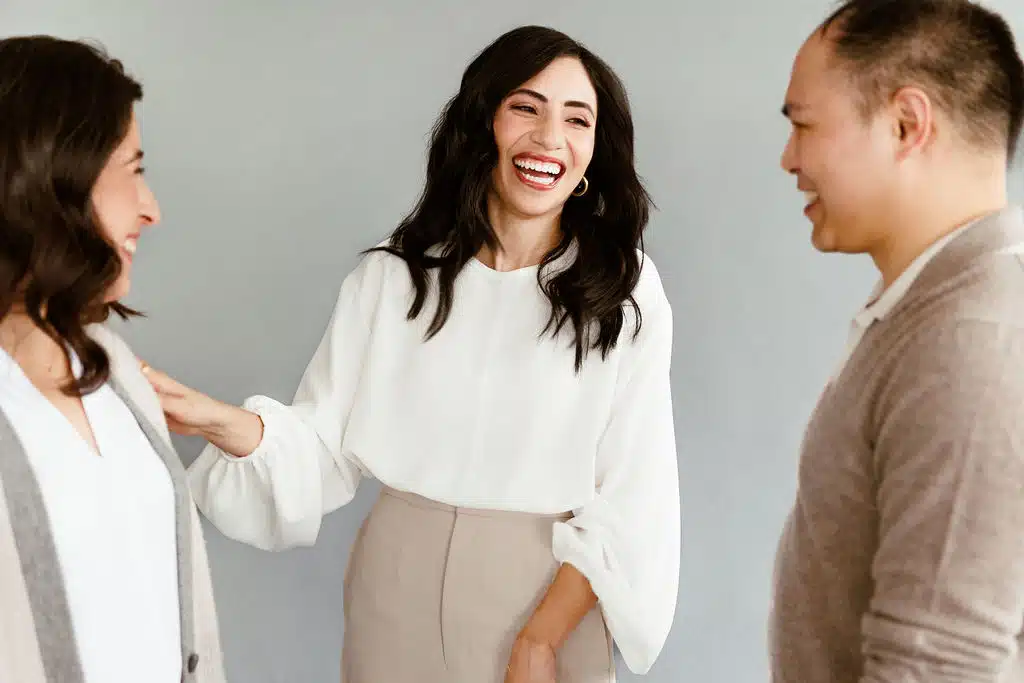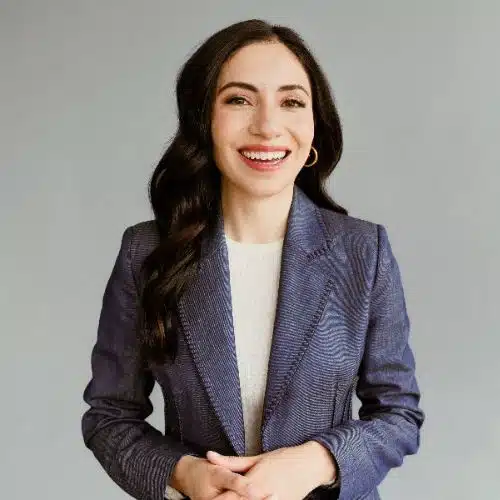That’s how long you have to make the right impression on your future boss.
Fortunately, you have control over at least one thing: your wardrobe.
Both men and women should follow specific interview dress tips, but you don’t have to sacrifice your personal style and creativity.
Here are 7 tips for what to not wear to an interview:
1. Ill-Fitting Clothes (Especially Blazers)
Photo Credit: @Theory_
The blazer is a staple of a job interview outfit. Blazers work well for everyone because it adds structure and polish to your look.
The biggest problem with blazers?
Many interview candidates aren’t wearing a properly-fitted blazer. Luckily, it’s pretty simple to ensure fit, just follow these 3 steps:
- Check the shoulder seam to see if it hits in the correct place. It should hit right at the edge of your shoulder.
- Determine how tight your jacket is by sliding a flat hand between the jacket fabric and your shirt. You should be able to do this easily, but there shouldn’t be a ton of extra room between your hand and the blazer.
- Finally, check the length of the blazer. The top button should be above the belly button (if not, your blazer may be too long for your torso). There should be no pulling across the chest of the blazer and you should be able to move your arms freely. You don’t want your body language and gestures constricted during your interview.
Button-down shirts are another area where it’s easy to make mistakes.
As a personal stylist, I see a lot of button-down shirts that pull across the chest and sleeves that are either too long or too short.
Remember, a quick trip to the tailor can make a huge difference in the fit of your blazers and shirts.
If you’re intimidated by getting tailoring, apply for our men’s image consulting services. We’ll help you create a powerful executive image and advise you on exactly what to ask for at the tailor so you feel confident going into your interview.
2. Too Sexy or Inappropriate
Photo Credit: @Vince
Both men and women should check interview outfits for extremely tight or revealing pieces.
For instance, the top above is an example of what not to wear to an interview.
While dress pants can and should be well-fitted, that does not mean skin-tight.
Remember that fitted does not mean super tight, but flattering the body instead.
Women should avoid low-cut tops, but that doesn’t mean they need to avoid V-necks and scoop style shirts altogether.
No midriff should be showing either (ensure your shirt will cover the stomach entirely even if you were to reach up high). Skirts should hit just above or at the knee.
In short, it’s your high school dress code rules all grown up.
Certain types of pantyhose, such as fishnet, also carry an “evening” feel and are typically not appropriate for the workplace.
While tights and pantyhose have made quite a comeback, stick with semi-opaque black or nude, matte colors for formal settings like an interview.
3. A Sloppy Tie
Photo Credit: @TomasLasoArgos
A tie can make or break an outfit for men wondering what to wear to an interview, but how you tie the tie is equally important.
Many men are wearing a tie that’s too long or short in length; the tie should end in the middle of your belt, not up by the belly button and not down below the belt.
Either of these errors indicates inattention to detail, which isn’t a trait you want on display through your interview clothes.
Often men are also imprecise in cinching the knot.
Make sure to knot it all the way up, with the top button fastened underneath. This isn’t a time to be showing a “bit of chest hair.”
View this profile on Instagram
SUITSURMESUR® (@suitsurmesur) • Instagram photos and videos
Photo Credit: @SUITSURMESUR
For a powerful and put-together look, tie your tie with a “dimple,” which is a small indent just below the tie knot (like in the photos above and below). This will show future employers that you take the time to ensure small details are done well.
Photo Credit: @TomasLasoArgos
4. Fearing Color (Or Overdoing It)
When you think of what you should wear to an interview, a black suit with a white button-down may come to mind.
But there are actually quite a few colors that can make you stand out in this setting.
Men in formal, traditional offices should wear dark blue or gray with a core color underneath for the shirt. Ties should communicate sophistication and a subtle style that isn’t distracting.
Here are two more color tips for what not to wear to an interview:
First, stay away from patterns that are loud or distracting.
Second, avoid wearing neon colors or mixing bold or bright colors.
Save your creativity for shoes, accessories, or even a fun lipstick shade, within reason.
In fact, in our women’s image consulting service, we’ll help you find a makeup look that matches your vision for your personal brand.
5. Not Considering Company Culture
Photo Credit: @ForbesUnder30
Some workplaces have a more casual dress code than others.
Interviewing to be a lawyer at a traditional firm requires a much different outfit than a graphic designer dressing for a tech startup.
Dressing too casually or too “stuffy” can signal to the employer that you haven’t done your homework on the vibe and environment of the workplace.
However, when you are deciding what to wear in a workplace, lean towards something more formal.
Check to see what more senior members of that office wear. Don’t emulate someone who has been there for ten years and is flirting with the line on how casual “Casual Friday” can get.
In other words, you can show you’d fit in without dressing down too much, even in a creative setting.
No matter how “chill” you think your new workplace is, there’s no situation in which leggings are a good idea. Leggings will always fall under the category of what not to wear to an interview (unless they are under a dress, in which case you should consider tights instead).
Shoes are another important part of your interview outfit. When it comes to what shoes not to wear to an interview, these shoes are too informal:
– Sandals and Flip Flops
– Open-Toe Shoes
– Gym Shoes
– Sneakers
Consider the traits your future employer would value most and then reflect those in your wardrobe choices.
For example, a creative entrepreneur needs to be seen as unique and sometimes quirky, while a finance director wants to be seen as precise.
6. Wearing Uncomfortable Clothes
Photo Credit: @IgeeOkafor
Another example of what not to wear on/to a job interview?
Anything that’s uncomfortable!
A jacket that limits your movements, shoes that pinch, or a waistband that is too tight, can negatively affect your performance in the interview.
Your goal is to give the impression that you are confident, powerful, and focused.
The last thing you want is to be fidgeting, wincing, or otherwise distracted by your clothing. This can give the impression that you’re distracted, self-conscious, or even not paying attention.
Make sure you invest in clothing and shoes for your interview that are comfortable so that you can be 100% focused and present in the moment.
7. Forgetting The Details
View this post on Instagram
Photo Credit: @DWFashion
Sometimes when it comes to what to wear to an interview, the most important elements are the details.
As a potential employee, you want to show that you are detail-oriented. This means that you need to be aware of how even small touches can affect your look.
Before your interview, ensure that your clothing is clean and wrinkle-free. Stains, odors, and wrinkles send the wrong message to employers.
Be mindful of fragrances as well.
If you decide to wear a fragrance, it should be light and subtle. An overpowering scent can be obnoxious or trigger migraines for people who are sensitive to fragrance.
You should also take account of other details like facial hair and makeup. In general, you want to look clean, fresh, and professional. This generally means simple makeup that highlights your features, without being dramatic or distracting.
Danielle’s makeup in the photo above is a great example of neutral, put-together makeup that enhances her natural beauty.
Next Level Wardrobe offers image consulting and personal styling services to men and women. Contact us to develop a personal brand image that makes you look and feel your best.



